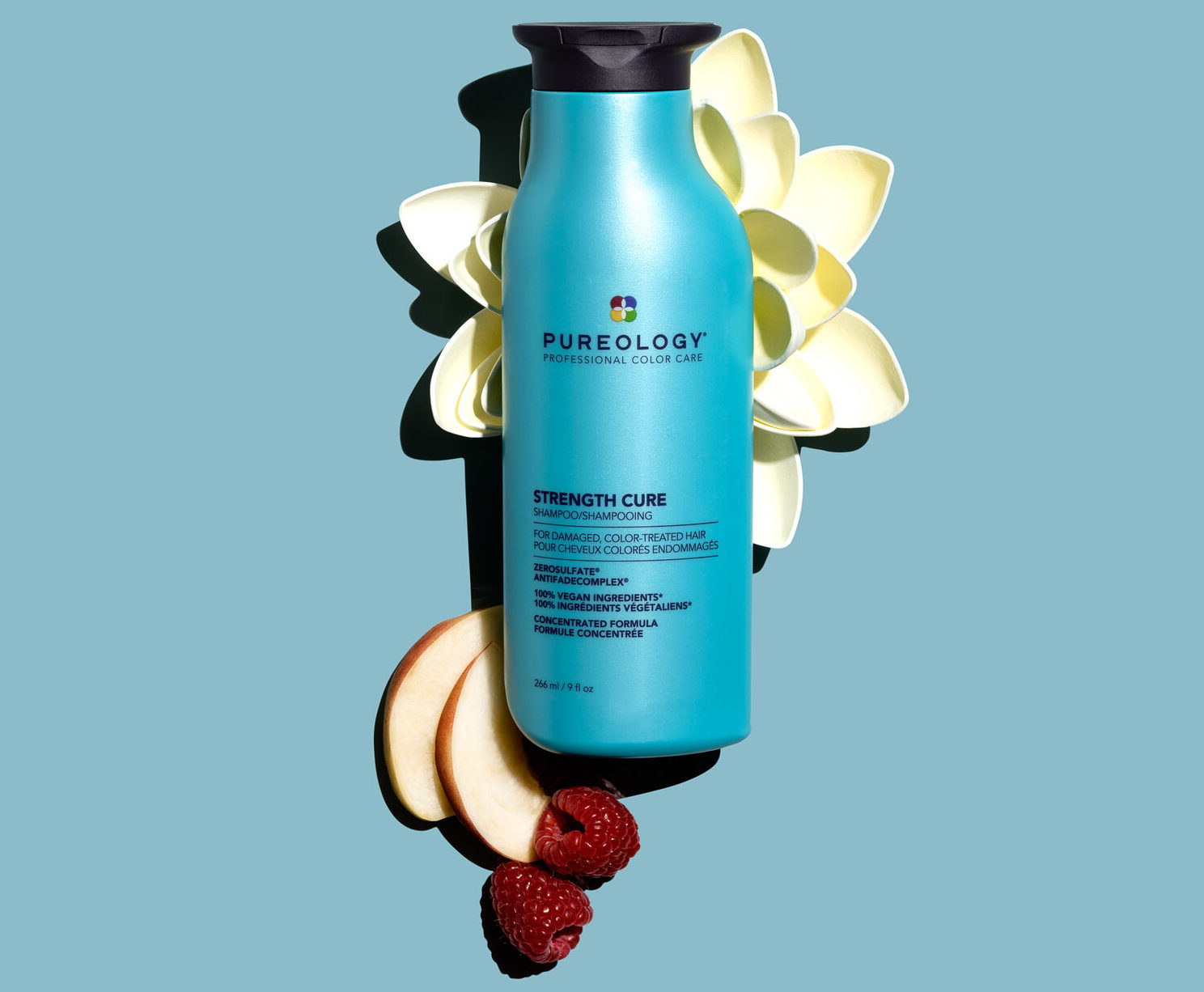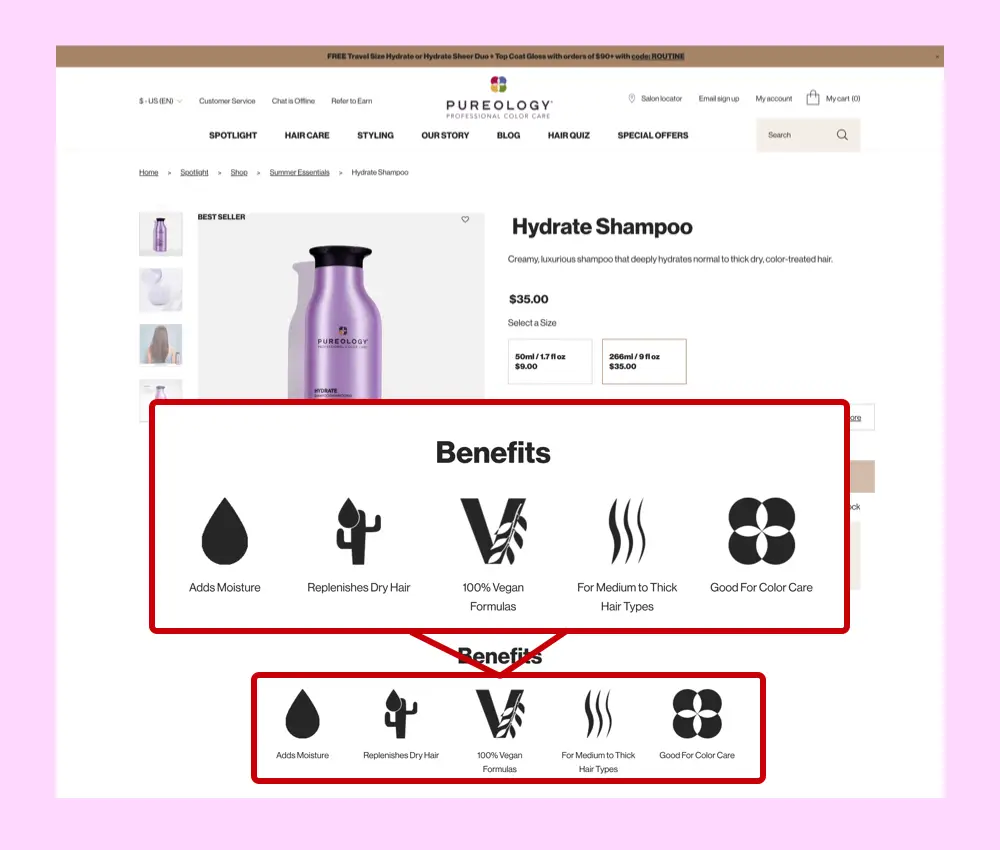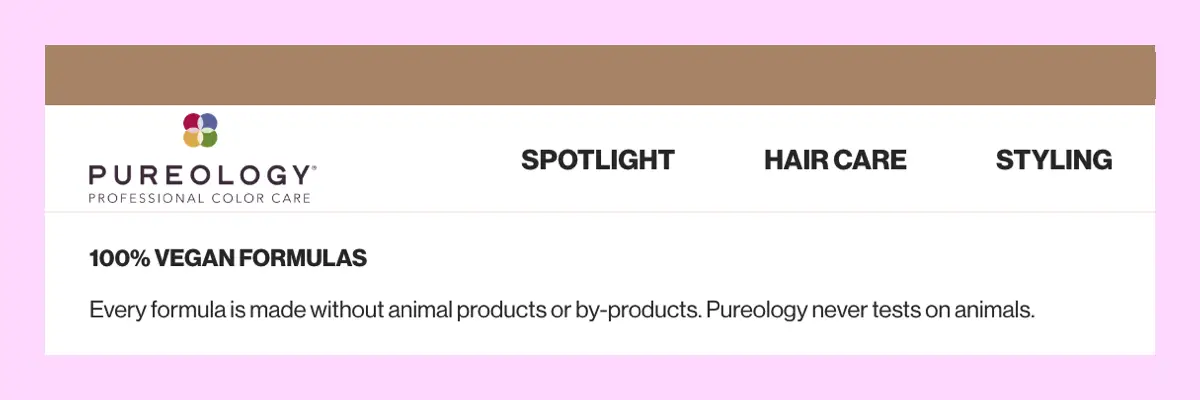Pureology is the OG sulfate-free brand and has a proud legacy in salons around the globe. Could this color care hair brand be the triple threat of cruelty-free, vegan and clean beauty?
Pureology is cruelty-free. It doesn't conduct animal testing on its products, nor does it distribute its cosmetics where animal testing is required by law. Pureology is also 100% vegan and doesn't use animal-derived ingredients.
This salon color care line is why you’ve heard of sulfate-free shampoo and the reason you love it!
Founder Jim Markham officially launched Pureology in 2001 and initially specialized in making vegan color care for salons. But the Californian brand has evolved into so much more since then.
Today it makes a wide range of hair care products that are still all sulfate-free.
But, since they were bought by L’Oréal in 2007 – are they still technically “vegan” too?
We know that the brand has recently updated its look, formulas, and inclusivity standards, but what does any of it mean.
Is Pureology Cruelty-Free and Vegan?
Pureology is 100% Cruelty-Free
It does not:
Pureology is proudly cruelty-free, with PETA certification to prove it.
But there’s a bit of unfortunate news:
Not all hope is lost yet though…
Pureology is Vegan
Hallelujah – this salon-quality, accessible haircare brand is entirely vegan. It does not use any animal-derived ingredients in any of its products.
And if you're ever unsure – you'll find a vegan stamp underneath each product's list of benefits on the Pureology website.
It's worth knowing that Pureology is the exception and not the rule.
Most mainstream skincare brands are not 100% vegan. These are certain animal-derived ingredients to look out for in general:
If you're interested in the best Pureology vegan products or finding brand alternatives – keep reading or click on this link: Pureology vegan products.
Animal Testing Policy and History
Pureology is committed to developing high-end, vegan color-haircare and styling products that are cruelty-free. This has been part of the brand’s ethos since it launched.
Cruelty-Free Status in 2022
Here is a screenshot of Pureology's official statement regarding its cruelty-free policies and vegan products, taken from its website:
It is fair and factual to say that Pureology is cruelty-free and does not test on animals.
However, we cannot say the same for L’Oréal.
It claims that it ‘has carried out no animal testing since 1989 on its entire range of products. But, it still owns many brands that sell products in regions where animal testing is required by law.
More on that in a moment...
Certification
Pureology is PETA certified, which is not a bad start.
However, it would be nice to see more certification since it’s so proudly cruelty-free.
While you might know PETA very well – it surprisingly doesn't hold the strictest cruelty-free regulations. It seems only to require a brand's written consent that abides by the PETA code of conduct.
Certification from Leaping Bunny is ideal because it holds rigorous standards and does regular audits to ensure they are upheld.
The Leaping Bunny association is very strict and reliable, which ensures that:
If you see a bunny stamp on the back of your product bottle – that's an excellent sign. But don't let the image itself fool you.
A lot of brands are using fake logos to deceive consumers.
Do your homework and see which products are genuinely cruelty-free first. This article will help you: Which Cruelty-Free Logos Can You Trust?
Is Pureology Sold Where Animal Testing is Required By Law?
Pureology does not distribute any of its products to China or any country that requires animal testing on cosmetics by law.
China has a shocking track record. It is the country with the most animal testing globally, with over 20 million animals used per year.
However, if you live in China or are concerned about its cruel beauty policies, there are a couple of loopholes.
Here's how to find cruelty-free cosmetics in China: Are Cosmetics Made in China Cruelty-Free?
The Best Vegan Pureology Products
Since Pureology is entirely vegan – you have an extensive choice of products at your fingertips.
The brand loves to develop products with you (as the consumer) in mind and tailors its launches according to your hair’s needs.
But if you’re just trying to gauge what’s most popular, here are some of Pureology’s top picks.
You can find the complete range of Pureology’s vegan products on their website.
Vegan Alternatives to Pureology
We love what Pureology represents.
It's 100% cruelty-free, vegan, and users claim it to be effective too.
But if the brand is not easily accessible to you, it’s a bit too expensive, or if you won’t support a brand with a non-cruelty-free parent company – here are some other great options:
Is Pureology Natural and Organic?
Pureology isn’t considered natural or organic.
However, it claims to use safe, simple, clean ingredients.
Its whole ethos is to make sulfate-free formulas and products anyone can use.
Clean vs. Natural Ingredients
The term "natural" is not regulated for cosmetics and skincare. In other words, it doesn't hold one specific meaning.
Usually, it means a product is free of more toxic synthetic ingredients, including parabens, phthalates, sulfates, and more. But people also interpret "natural" to mean ingredients of immediate plant origin.
Here's the thing: "natural" is not necessarily good. Just because an ingredient is natural (take egg whites, for example) doesn't mean you should rub it on your skin and risk a salmonella infection!
All products use a certain amount of synthetic ingredients in their formulas. Pureology is no exception – but it does choose to use better or clean synthetics.
If a synthetic ingredient is "clean," it means it is safe and non-toxic for us. Its purpose is to preserve the stability of a beauty formulation.
A few naturally-derived ingredients Pureology uses to enhance its cosmetics include:
Does Pureology Use Safe Ingredients?
According to Skin Safe, Pureology has a 73- 91% allergen-free ranking across 113 products.
All Pureology products are 100% sulfate, paraben, and mineral oil free.
Many are also free of allergens, such as coconut, common preservatives, MCI/MI, propylene glycol, nickel, soy, and gluten.
Reading the ingredient list is crucial because Pureology is not 100% hypoallergenic or non-comedogenic, and they do not claim to be.
Certain products are specifically for these concerns, so make sure you buy what your skin needs.
But we must say – after all their brand refresh hoo-ha in 2020 talking about newer clean standards, we were kinda hoping for more ingredients to be on their ‘no list.’
The EU/UK Have Stricter Ingredient Regulations
We don’t want to scare you, but you HAVE to read up on any product’s ingredient list before you make a purchase – especially if you live within the United States. The reason why will shock you.
The FDA has only banned or restricted 11 harmful chemicals from cosmetics within the country. Europe and the UK, on the other hand, have banned 1,328!
Pureology is quite a safe haircare brand to bet on. But all ingredients are subject to change, so it’s worth reading product labels no matter how many times you’ve bought them.
With hair care, you want to avoid these ingredients:
Are Cruelty-Free Ingredients Safe?
If you’re worried about how safe it is to use cosmetics not tested on animals – please relax and take a sigh of relief.
There is no reason why cruelty-free products shouldn’t be as safe as anything tested on animals.
Not only is it easy to test ingredients without using animals altogether, but there are so many pre-approved ingredients you can use to make cosmetics that there is no need.
If you’re interested, here’s more on the subject: Are Cruelty-Free Cosmetics Safe?
Is Pureology Sustainable and Ethical?
Pureology has some sustainability initiatives that tie in with the company values.
As it stands, the brand:
Some of the ways Pureology is taking strong environmental accountability is by:
We would love them to include some of these environmental solutions:
Final Thoughts
As a prestige, salon-quality color care brand with a 2-decade history, Pureology considers some ethical factors. Mainly being cruelty-free and vegan.
Staying that way after being acquired by L’Oreal was a big step towards a more sustainable future in the beauty industry.
We appreciate its transparent supply chain and openness to the public about its testing, purchasing, and distribution policies.
Of course, Pureology is owned by a parent company that allows animal testing on some of its brands. So, it might not be the best choice for activists who go the extra mile.
The brand's sulfate-free start was great, but clean beauty standards have evolved far beyond that since y2k. Pureology could also do much more for the environment and support social causes.
Finally, it would also be nice to see further cruelty-free accreditation from other reputable organizations. So let's push to make that happen!



